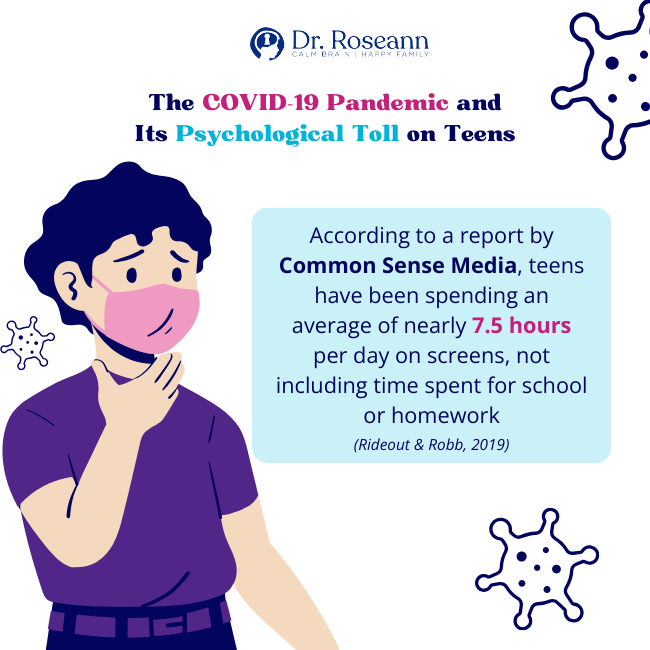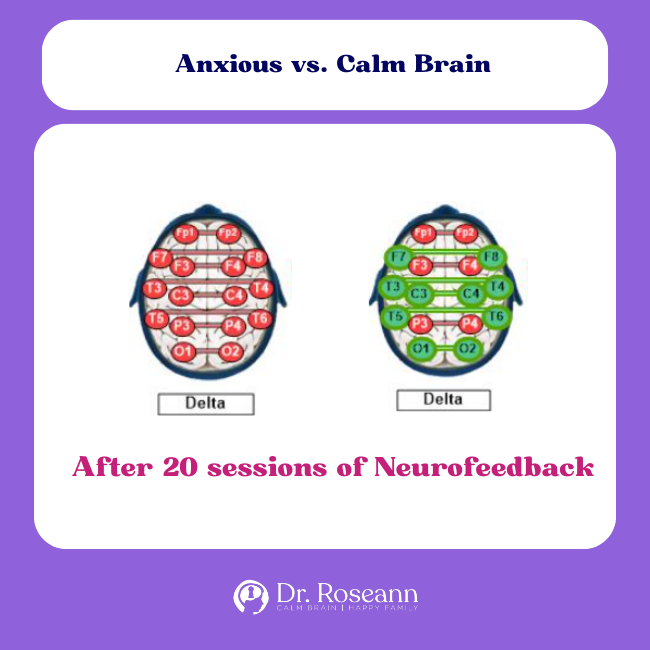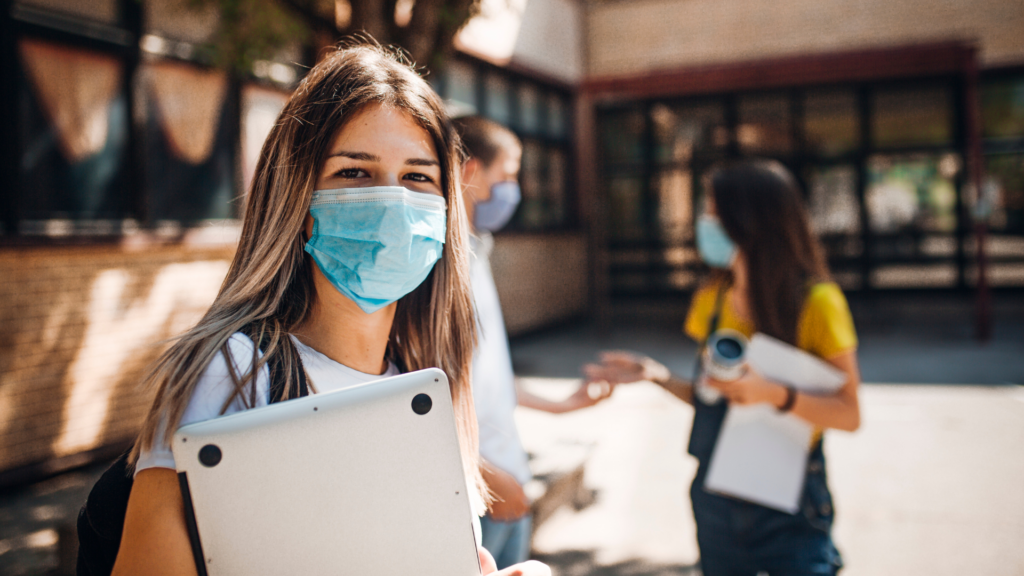The COVID-19 pandemic has left an indelible mark on the world, transforming our daily lives in unprecedented ways. Among the most affected are our children and teens, who have faced not only the threat of a novel virus but also drastic changes to their everyday routines and social interactions. The pandemic’s overall impact on mental health, especially among the younger generation, is a topic of increasing concern.
Children's mental health statistics during the pandemic paint a worrying picture, with significant increases in anxiety, depression, and stress-related disorders among young people.
Furthermore, the emergence of what is now known as “COVID Brain” has added a new dimension to our understanding of the pandemic's impact, particularly on adolescent mental health. This blog aims to explore the concept of “COVID Brain,” its implications for teen mental health, and how parents can proactively support their children through natural solutions and prioritizing mental well-being.
The Emergence of “COVID Brain” in Adolescents
“COVID Brain” refers to a range of neurological and psychological symptoms that have been observed in individuals after infection with SARS-CoV-2, the virus responsible for COVID-19. These symptoms can include brain fog, memory issues, and concentration difficulties.
Recent studies (Corrigan, Rokem & Kuhl, 2023) have linked COVID-19 to changes in adolescent brain development, suggesting that the pandemic has had a profound impact on the developing brains of young people. One major finding is that in the teen brains scanned there was an abnormal and premature” thinning of the brain's the outer layer of the brain or the cortical surface.
The alterations are thought to be associated with the stress and disruption caused by the pandemic, affecting areas of the brain responsible for emotional regulation and cognitive processes (Corrigan, Rokem & Kuhl, 2023).
Another major finding is certain groups are more affected by mental health issues than others. Females, LGBTQ+ teens and those from minority racial and ethnic groups have a higher rate of mental health issues (Corrigan, Rokem & Kuhl, 2023).
The COVID-19 Pandemic and Its Psychological Toll on Teens
The pandemic has been particularly challenging for teens, who have experienced increased stress and mental health challenges. The abrupt shift to remote learning, social isolation, and uncertainty about the future has significantly impacted their psychological well-being.
Additionally, the increased reliance on digital devices during the pandemic has become a notable factor. According to a report by Common Sense Media, teens have been spending an average of nearly 7.5 hours per day on screens, not including time spent for school or homework (Rideout & Robb, 2019).

This surge in screen time, necessitated by remote learning and social restrictions, further compounds the issue of reduced physical activity and direct social interaction, both of which are crucial for healthy adolescent development.
Passive screen time usage has been associated with increased anxiety and depression in teens. On a positive note, interactive screen time with peers is associated with positive mental health due to the social interaction with peers. Excessive screen time usage is still cautioned especially for young children.
The lack of regular social interaction, a critical aspect of adolescent development, has led to heightened feelings of loneliness and anxiety. This correlation between social isolation and mental health deterioration is a key area of concern, highlighting the need for effective support systems for our young people.
Scientific Insights: MRI Studies and Adolescent Brain Changes
Recent MRI studies have provided valuable insights into how the pandemic has affected adolescent brains. Researchers have observed structural changes in the brains of teens pre- and post-COVID, with significant alterations linked to chronic stress (Corrigan, Rokem & Kuhl, 2023).
These changes can have far-reaching implications for cognitive function and emotional health, underlining the importance of addressing these issues proactively.
QEEG Brain Map and The Anxious Brain

Quantitative Electroencephalogram (QEEG) Brain Mapping is a cutting-edge tool that offers a window into the functioning of the anxious brain. QEEG is a non-invasive process that measures electrical patterns at the surface of the scalp, reflecting cortical activity. It provides a detailed analysis of brain wave patterns and can be instrumental in understanding the neurological basis of anxiety and other clinical issues.
In individuals with anxiety, QEEG often reveals specific patterns of brain wave activity. For instance, there may be an imbalance between the brain's arousal and relaxation systems, often indicated by an overabundance of high-frequency beta waves and a shortage of calming alpha waves. This imbalance can manifest as a constant state of hyperarousal or heightened alertness, typical in anxiety disorders and common with people with looping, anxious thoughts.
QEEG Brain Mapping can thus play a crucial role in tailoring specific interventions for anxiety. By identifying the unique brainwave patterns associated with anxiety, we can develop a more personalized treatment plan. This might include neurofeedback therapy, where individuals learn to alter their brainwave patterns to achieve a more relaxed and focused state, or other interventions like cognitive-behavioral therapy (CBT) or mindfulness practices.
For teens facing anxiety, especially in the context of “COVID Brain,” a QEEG Brain Map offers a beacon of hope for more effective and individualized treatments unlike the traditional “whack-o-mole” approach we have in mental health today.
Gender Differences in Pandemic-Related Brain Development
Interestingly, the pandemic's impact on brain development appears to vary between genders. Studies focusing on cortical thickness variations have found that COVID-19 has affected male and female adolescent brains differently , with female brains being more affected (Corrigan, Rokem & Kuhl, 2023).
Understanding these gender-specific effects is crucial in developing targeted mental health interventions to support our youth during these challenging times.
Broader Implications: Mood Disorders and Brain Circuitry in Teens
The pandemic has also shed light on how pre-existing brain organization can influence a teen's response to stress and mood disorders. For instance, teenagers who experienced depression during the pandemic have shown altered connectivity in various brain networks (Corrigan, Rokem & Kuhl, 2023). These teens had altered connectivity and were more susceptible to mental health issues such as anxiety and depression, which is something that see on QEEG brain maps.
This connection between mood disorders, brain circuitry, and pandemic stress underscores the complexity of adolescent mental health issues and the need for comprehensive approaches to address them.
Addressing the Teen Mental Health Crisis: Interventions and Support Systems
In response to these challenges, it is essential for parents, educators, and healthcare professionals to come together to support teen mental health. Recognizing and addressing the symptoms of “COVID Brain” in adolescents is a critical first step.
Beyond medical interventions, non-medication natural solutions such as a healthy diet, regular exercise, mindfulness practices, and fostering strong family and community connections can be incredibly beneficial. Focusing on healthy coping skills and ways to manage stress is something we just aren’t focusing on. Much of my work is focused on teaching parents ways to calm the brain and build stress tolerance.
Encouraging open communication and providing a supportive environment where teens feel safe to express their feelings and concerns is also vital.
Future Directions and Research
As we continue to navigate the aftermath of the pandemic, ongoing research into “COVID Brain” and its long-term effects on adolescent mental health is crucial.
Early intervention and continued support can help mitigate potential long-term impacts on our youth's mental well-being. That means not just recognizing a child or teen has a mental health issue but actually getting them support. Helping them through emotional regulation activities and working on family mental health is where we need to start.
Investing in such interventions is not just a health imperative but a societal necessity.
Final Thoughts on The Teen COVID Brain and Mental Health
The concept of “COVID Brain” has brought to light the significant impact of the pandemic on teen mental health. As we move forward, it is imperative that we prioritize the mental well-being of our young people, embracing both medical and natural solutions.
With mental health issues as common as one in two individuals will experience mental health issues in their lifetime, we need to turn to the science of what effectively supports the brain and mental health. Using natural solutions such as magnesium, supplements, neurofeedback, PEMF and the right type of psychotherapy for specific issues, should be at the forefront of mental health treatment.
By increasing awareness and support for adolescents affected by pandemic-related stress, we can help them navigate these challenging times and emerge stronger. The journey ahead may be long, but together, we can ensure a healthier, more resilient future for our children and teens.
Magnesium L-Threonate can be your next step to starting with natural solutions and it can help improve your child’s or teen’s stress and anxiety.
Citations
N. M. CORRIGAN1, A. ROKEM2, P. K. KUHL3;
1Inst. for Learning & Brain Sci., 2Psychology, 3Speech and Hearing Sci., Univ. of Washington, Seattle, WA. Covid-19 effects of adolescent brain structure suggest accelerated maturation. Program No. PSTR451.09. 2023 Neuroscience Meeting Planner. Washington, D.C.: Society for Neuroscience, 2023. Online. https://www.abstractsonline.com/pp8/#!/10892/presentation/22255
Rideout, V., & Robb, M. B. (2019). The Common Sense census: Media use by tweens and teens, 2019. Common Sense Media. https://www.commonsensemedia.org/research/the-common-sense-census-media-use-by-tweens-and-teens-2019.
SOCIETY FOR NEUROSCIENCE. Understanding the stressed, depressed, adolescent brain. Retrieved on Nov. 12, 2023. https://www.eurekalert.org/news-releases/1005597
White, Robyn (Nov 11, 2023). Brain Scans Reveal How COVID Pandemic Affected Teenagers. Newsweek. https://www.newsweek.com/brain-scans-reveal-covid-pandemic-teenagers-1842655
Are you looking for SOLUTIONS for your struggling child or teen?
Dr. Roseann and her team are all about science-backed solutions, so you are in the right place!
Grab your complimentary copy of
147 Therapist-Endorsed Self-Regulation Strategies for Children: A Practical Guide for Parents
You can get her books for parents and professionals, including: It’s Gonna Be OK™: Proven Ways to Improve Your Child’s Mental Health, Teletherapy Toolkit™ and Brain Under Attack: A Resource For Parents and Caregivers of Children With PANS, PANDAS, and Autoimmune Encephalopathy.
If you are a business or organization that needs proactive guidance to support employee mental health or an organization looking for a brand representative, check out Dr. Roseann’s professional speaking page to see how we can work together.
Dr. Roseann is a Children’s Mental Health Expert and Licensed Therapist who has been featured in/on hundreds of media outlets including The Mel Robbins Show, CBS, NBC, PIX11 NYC, Today, FORBES, CNN, The New York Times, The Washington Post, Business Insider, Women’s Day, Healthline, CNET, Parade Magazine and PARENTS. FORBES called her, “A thought leader in children’s mental health.”

She coined the terms, “Re-entry panic syndrome” and “eco-anxiety” and is a frequent contributor to media on mental health.
Dr. Roseann Capanna-Hodge has three decades of experience in working with children, teens and their families with attention-deficit hyperactivity disorder (ADHD), autism, concussion, dyslexia and learning disability, anxiety, Obsessive Compulsive Disorder (OCD), depression and mood disorder, Lyme Disease, and PANS/PANDAS using science-backed natural mental health solutions such as supplements, magnesium, nutrition, QEEG Brain maps, neurofeedback, PEMF, psychotherapy and other non-medication approaches.
She is the author of three bestselling books, It’s Gonna Be OK!: Proven Ways to Improve Your Child's Mental Health, The Teletherapy Toolkit, and Brain Under Attack. Dr. Roseann is known for offering a message of hope through science-endorsed methods that promote a calm brain.
Her trademarked BrainBehaviorResetⓇ Program and It’s Gonna be OK!Ⓡ Podcast has been a cornerstone for thousands of parents facing mental health, behavioral or neurodevelopmental challenges.
She is the founder and director of The Global Institute of Children’s Mental Health, Neurotastic™Brain Formulas and Dr. Roseann Capanna-Hodge, LLC. Dr. Roseann is a Board Certified Neurofeedback (BCN) Practitioner, a Board Member of the Northeast Region Biofeedback Society (NRBS), Certified Integrative Mental Health Professional (CIMHP) and an Amen Clinic Certified Brain Health Coach. She is also a member of The International Lyme Disease and Associated Disease Society (ILADS), The American Psychological Association (APA), Anxiety and Depression Association of America (ADAA) National Association of School Psychologists (NASP), International OCD Foundation (IOCDF).
© Roseann-Capanna-Hodge, LLC 2023










